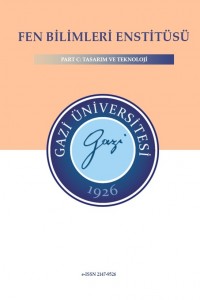Abstract
Tarihin karanlık devirlerinden bu yana insanoğlu hayatını kolaylaştırma amacı ile sürekli bir gelişim içerisindedir. İnsanoğlunun her ilerleyişi ile dünya kaynakları hızla tükenmektedir. Sanayileşmenin dünyanın tüm ülkelerine yayılması bu durumu kaçınılmaz olarak hızlandırmaktadır. Ulaştırma sektöründe yaygın olarak kullanılan içten yanmalı motorların enerji kaynağı olan fosil yakıtlara olan ihtiyaç sürekli artmasına rağmen rezervler ise sürekli olarak azalmaktadır. Bununla birlikte yakıt yanma reaksiyonu sonucu egzoz gazı emisyonlarının etkisi ile çevreye büyük zararlar verilmektedir. Bu nedenler ile alternatif enerji kaynakları ile çalışan araçlar geliştirilmeye başlanmıştır. Bu kapsamda, günümüzde tamamen elektrikli araç geliştirilmesi çalışmaları yapılmaktadır. Jant içi elektrik motoru çalışmaları ise tamamen elektrikli araç geliştirmelerinden birisidir. Bu çalışmada, önceden tasarlanmış bir elektromobil aracın düz sert bir duvara önden çarpışması, ANSYS Workbench LS-DYNA bilgisayar destekli mühendislik (CAE) yazılımı aracılığı ile numerik olarak incelenmiştir. Analiz, yapısı gereği zamana bağlı dinamik bir analiz olduğundan dolayı açık (İng. Explicit) sonlu elemanlar yöntemi kullanılarak icra edilmiştir. Araç modeli içine kukla model yerleştirilerek kukla modelin baş, göğüs ve uyluk kemiklerinde çarpışma etkisi ile oluşan ivme, kuvvet ve sapma değerleri verileri elde edilmiştir. Elde edilen veriler, çeşitli otoriteler tarafında kabul gömüş olan yaralanma kritik sınır değerleri ile karşılaştırılarak kukla modelin yaralanma durumu ile ilgili çıkarımlarda bulunulmuştur.
References
- [1] G. Zhao, L. Xie, Y. Guo, J. Li, Analysis and Evaluation on the Rear-End Crash of the Car with a Dummy, in: 2009 Int. Conf. Meas. Technol. Mechatronics Autom., IEEE, 2009: pp. 475–478.
- [2] T. Ambati, K.V.N.S. Srikanth, P. Veeraraju,., Simulation of Vehicular Frontal Crash-Test, Int. J. Appl. Res. Mech. Eng. (2012) 2231–5950.
- [3] L. Berzi, N. Baldanzini, D. Barbani, M. Delogu, R. Sala, M. Pierini, Simulation of Crash Events for an Electric Four Wheel Vehicle, Procedia Struct. Integr. 12 (2018) 249–264
- [4] AAAM, The Abbreviated Injury Scale (AIS), https://www.aaam.org/abbreviated-injury-scale-ais/ (Erişim tarihi: 19 Mayıs 2019).
- [5] EEVC Working Group 14 Report, Development of Test Procedure for Energy-absorbing Front Underrun Protection Systems for Trucks, 1996.
- [6] B. McHenry, Head Injury Criterion and the ATB, ATB Users’ Gr. (2004) 1–8.
- [7] C.W. Gadd, Criteria for Injury Potential, in: Impact Accel. Stress Symp., National Academy of Science, Washington DC, 1962: pp. 141–144.
- [8] J. Versace, A Review of the Severity Index, in: SAE Tech. Pap., SAE International, 1971.
- [9] R. Eppinger, E. Sun, F. Bandak, M. Haffner, N. Khaewpong, M. Maltese, S. Kuppa, T. Nguyen, E. Takhounts, R. Tannous, A. Zhang, R. Saul, Development of improved injury criteria for the assessment of advanced automotive restraint systems–II, Natl. Highw. Traffic Saf. Adm. (1999).
- [10] P. Prasad, H.J. Mertz, The Position of the United States Delegation to the ISO Working Group 6 on the Use of HIC in the Automotive Environment, in: SAE Tech. Pap., SAE International, 1985.
- [11] V.R. Hodgson, L.M. Thomas, Breaking Strength of the Human Skull Versus Impact Surface Curvature, Wayne State Univ. (1977).
- [12] V.R. Hodgson, L.M. Thomas, J. Brinn, Concussion Levels Determined by HPR Windshield Impacts, in: SAE Tech. Pap., SAE International, 1973.
- [13] C. Got, A. Patel, A. Fayon, C. Tarrière, G. Walfisch, Results of Experimental Head Impacts on Cadavers: The Various Data Obtained and Their Relations to Some Measured Physical Parameters, in: SAE Tech. Pap., SAE International, 1978.
- [14] C. Tarriere, G. Walfisch, A. Fayon, C. Got, F. Guillon, A. Patel, J. Bureau, Acceleration, Jerk and Neck Flexion Angle: Their Respective Influences on the Occurrence of Brain Injury, ISO, TC 22, SC 12, GT-6 (USA-13), Doc. No. 118. (1982).
- [15] E. Hertz, A note on the head injury criterion (HIC) as a predictor of the risk of skull fracture, Assoc. Adv. Automot. Med. (1993).
- [16] V.K. Lau, D.C. Viano, Influence of impact velocity and chest compression on experimental pulmonary injury severity in rabbits, J. Trauma - Inj. Infect. Crit. Care. (1981).
- [17] J.D. Horsch, J.W. Melvin, D.C. Viano, H.J. Mertz, Thoracic Injury Assessment of Belt Restraint Systems Based on Hybrid III Chest Compression, in: SAE Tech. Pap., SAE International, 1991.
- [18] J.Y. Foret-Bruno, F. Hartemann, C. Thomas, A. Fayon, C. Terrière, C. Got, A. Patel, Correlation Between Thoracic Lesions and Force Values Measured at the Shoulder of 92 Belted Occupants Involved in Real Accidents, in: SAE Tech. Pap., SAE International, 1978.
- [19] N. Yoganandan, D. Skrade, F.A. Pintar, J. Reinartz, A. Sances, Thoracic Deformation Contours in a Frontal Impact, in: SAE Tech. Pap., SAE International, 1991.
- [20] H.J. Mertz, A.L. Irwin, J.W. Melvin, R.L. Stanaker, M.S. Beebe, Size, Weight and Biomechanical Impact Response Requirements for Adult Size Small Female and Large Male Dummies, in: SAE Tech. Pap., SAE International, 1989.
Details
| Primary Language | Turkish |
|---|---|
| Subjects | Engineering |
| Journal Section | Research Article |
| Authors | |
| Publication Date | June 28, 2020 |
| Submission Date | January 21, 2020 |
| Published in Issue | Year 2020 Volume: 8 Issue: 2 |


